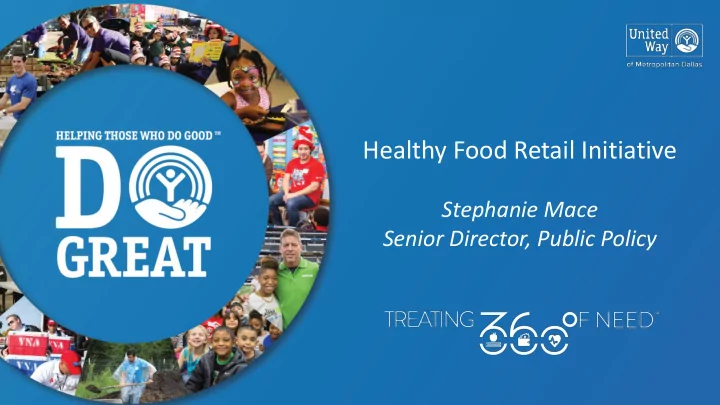

Healthy Food Retail Initiative Stephanie Mace Senior Director, Public Policy
The Need for Healthy Retail In In Dall llas ✓ 36% of Dallas Zip Codes are USDA food deserts (estimated 700,000 residents, including 245,000 children). ✓ Diet related disease will cost TX taxpayers $32.5 billion by 2030 if unaddressed. ✓ Food desert communities in Dallas have not been successful at attracting larger supermarkets, so transportation constrained residents rely on small corner stores with limited to no heathy foods. ✓ The Healthy Food Retail Initiative builds upon smaller neighborhood level resources, and promotes neighborhood level development including the linkage of local producers with store owners. ✓ The Food Trust Healthy Food Retail Initiative has been highly successful in other similar cities. UnitedWayDallas.org | @UnitedWayDallas UnitedWayDallas.org | @UnitedWayDallas
Phil iladelphia Corner Store In 2004, The Food Trust piloted the Healthy Corner Store Initiative to motivate youth and adults to purchase healthier items through classroom education and direct marketing in the corner stores. UnitedWayDallas.org | @UnitedWayDallas UnitedWayDallas.org | @UnitedWayDallas
Dall llas Healthy Food Retail In Init itiative (H (HFRI) Strategic Planning. Community consultation, extensive mapping, and customization to the varying neighborhood needs and resources. Selection of participating stores based on community input, business history, location safety, and acceptance of SNAP. COMPLETED IN APRIL 2016 UnitedWayDallas.org | @UnitedWayDallas UnitedWayDallas.org | @UnitedWayDallas
HFRI I Im Implementation Pla lan HFRI is comprised of four core programmatic elements: 1. Retailers Support / Store Conversions: Provision of training and resources for store owners and as well as internal and external improvements and renovations to participating stores. 2. Food Sourcing/Distribution: Identification of local suppliers and establishing cost- effective distribution channels. 3. Community Engagement: Ensuring inclusion throughout the community as well as strengthening essential local relationships to build credibility and trust. 4. Nutrition Education: Provision nutrition education programming and nutrition incentives to community members. *Corner Stores is not THE answer, but is a critical component of a holistic approach to food security UnitedWayDallas.org | @UnitedWayDallas UnitedWayDallas.org | @UnitedWayDallas
Next xt Steps • Seeking funding for pilot • Building relationships with community groups and food distributors • Spread awareness to all sectors UnitedWayDallas.org | @UnitedWayDallas UnitedWayDallas.org | @UnitedWayDallas
Recommend
More recommend